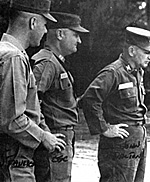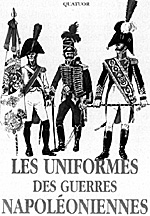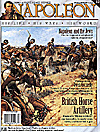Units and UniformsCANNONS AT A RAPID GAIT: 1793-1815 Popularly referred to as "flying artillery," Britain's Royal Horse Artillery (RHA) was a virtually autonomous arm of service under the Board of Ordnance. This caused no end of disputes with field commanders, including Wellington, over who controlled assignments and promotions. Initially armed with 4pdr cannon, the RHA bateries, called "troops" became standardized in 1809 with five 6pdr guns and one 5.5-inch howitzer. At its height, the RHA consisted of 14 troops, including two with rockets--the first battlefield use of this weapon in Europe. Better powder and a superior exploding shell called "shrapnel" gave the British gunners a distinct advantage in combat. By 1815, an improved 9pdr gun with an innovative single block trail carriage equipped four of the troops at Waterloo. Although often used as a "fire brigade" and rushed from reserve to critical points in the battle, the RHA never lost a gun to the enemy. By Arnold Blumberg. |
|
Featured Scholar
A MAVERICK TALKS "HORSE SENSE"
 Owen "Mike" Connelly is a former US Army Ranger who served in Korea, but is better known as a leading professor of history at the University of South Carolina since 1970 and a respected author of several major books on the French Revolution and Napoleon. Perhaps his most widely known book is Blundering to Glory which argued that Napoleon's success was due to his ability to improvise during a battle rather than work from a set plan. An avid equstrian, Connelly's personal experience with horses has provided him with special insight and opinions about cavalry, which he shares in Napoleon magazine's sixth interview by correspondence, conducted by Dr. June Burton.
Owen "Mike" Connelly is a former US Army Ranger who served in Korea, but is better known as a leading professor of history at the University of South Carolina since 1970 and a respected author of several major books on the French Revolution and Napoleon. Perhaps his most widely known book is Blundering to Glory which argued that Napoleon's success was due to his ability to improvise during a battle rather than work from a set plan. An avid equstrian, Connelly's personal experience with horses has provided him with special insight and opinions about cavalry, which he shares in Napoleon magazine's sixth interview by correspondence, conducted by Dr. June Burton.
Cuture and Politics
NAPOLEON AND THE JEWS
Was Napoleon was an enlightened ruler in a bigoted era, or did he emancipate the Jews of Europe for cynical, self-serving purposes? Historian Ben Weider enters this debate using primary sources that may indicate what Jews at that time thought about Napoleon. Weider is convinced that had Napoleon's campaign in Egypt been successful, the state of Israel would have come into existence 150 years before the UN mandated the partition of Palestine in 1948.
Departments
 Napoleonic Library: Reviews of selected books
Napoleonic Library: Reviews of selected books
-
Book News 1998
On the Fields of Glory
Les Uniformes des Guerres Napoleoniennes
Les Epogee Napoleonienne
Napoleon
Les Campagne de Russie 1812
Du Silex au Piston
Armes a Feu Francaises Modeles Reglementaires 1717-1836
Napoleonic Calendar: Letters, News, and Events
-
Napoleonic Saxon Heavy Cavalry
Book Review Feedback: Napoleon Bonaparte by Alan Schom
International Napoleonic Society Conference
Upcoming Events
Reader Feedback
Travel:
Game Review:
Back to Napoleon List of Issues
Back to Master Magazine List
© Copyright 1998 by Emperor's Press.
This article appears in MagWeb (Magazine Web) on the Internet World Wide Web.
The full text and graphics from other military history magazines and gaming magazines are available at http://www.magweb.com
